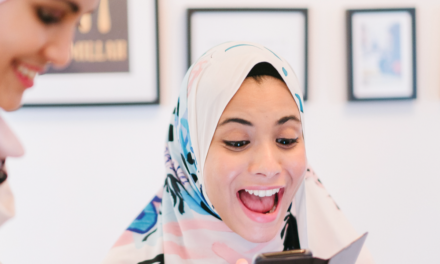The start of a New Year can inspire you to practice healthy habits. Being more responsible with your money might be one of your goals. In fact, Fidelity Investments’ 2020 New Year Financial Resolutions Study, found that 35% of Americans want to spend less money this year.
Cutting back on frivolous spending is undoubtedly useful, especially if you’re focusing on debt repayment, building up an emergency fund, or want to invest your money in other areas of your life. When you’re watching your spending under a microscope, however, spending money on yourself can also elicit guilt or shame.
Have you ever thought, “why do I feel bad when I spend money on myself?”
What you might not realize is that mindfully spending money on yourself is a part of financial wellness. Here’s what you need to know to learn how to spend money on yourself with no shame!
Why Guilty Spending Happens
Your past relationship with money, including your childhood experiences around money, play a part in your personal finances, and how you view spending. For example, if your household struggled financially, you might approach spending with strict frugality. If your material wants were generally taken care of without asking or with little push-back, the financial ease of spending on yourself as an adult might elicit feelings of shame.
Let’s say you’d like to grow your rainy-day fund, and received a performance bonus from your employer. Your first reaction might be to celebrate with a dinner out with friends. If you’ve meticulously tracked your spending and mercilessly cut unnecessary expenses, the desire to spend might create an internal conflict.
Do you direct your windfall to your savings account or give yourself permission to enjoy your career achievements?
Assuming you’ve been responsible with your money up to this point — for example, you’ve set up your savings fund so that 10% of your paycheck automatically deposits into your fund — agonizing over a celebratory dinner likely isn’t worth your mental health.
Spending guilt is real. But it doesn’t have to stay that way. Here are a few ways to learn how to spend money on yourself.
5 Tips to Learn How to Spend Money On Yourself
Whether you’re working toward a goal or simply want to reduce your spending overall, spending on yourself doesn’t have to be painful. Here are a few tips to help you thoughtfully enjoy non-guilty spending.
1. Have a Financial Plan in Place
By creating a financial plan, you’ve already done the heavy lifting when it comes to anticipating necessary costs, like rent and bills. At the same time, you can automate financial goals, like emergency savings, so that you can immediately see how much discretionary spending you can afford in any given month.
This insight reduces the uncertainty and shame you might experience after making a purchase for yourself. It gives you the peace of mind and security of knowing your essentials are taken care of and sets guidelines about how much money is left to enjoy.
2. Know Where Your Money Goes
Tracking your top spending categories can help you determine patterns and adjust your expectations accordingly. For example, let’s assume you allocate $250 a month for groceries and $100 a month for restaurants. After a few months, you found that you only spend an average of $100 on groceries, but go over-budget at restaurants by $200 on average.
Instead of feeling guilty spending on things like dining out, you can reallocate your funds in a way that’s realistic. Simply adjust your grocery budget to $125 per month and $225 per month. Now you have a spending budget that still works within the money you have.
Related: Budgeting 101: How to Create a Good Budget
3. Allow Yourself Some Flexibility
When you’re diligently working toward improving your finances, it’s easy to get caught in the weeds. Although being aware of hard numbers is useful, staying flexible to an extent is a healthy financial habit to adopt.
A spending plan that’s too stringent can feel suffocating and demotivating with the tiniest slip. Although it’s ideal to plan ahead, you can’t realistically anticipate everything in life. Give yourself — and your budget — some breathing room!
4. Make High-Value Purchases
Frivolous, or low-value spending is another reason you might experience guilt when spending on yourself. This might be buying formal shoes when you already have a closet full of formal footwear that you rarely use, or spending $150 monthly for an exclusive gym but don’t go because you prefer hiking as exercise.
Before spending money on yourself, think about how much value that purchase might bring into your day or life. For one person, the joy of spending $7 on a professionally made craft-coffee latte is what they need at the end of a rough work week. Another person might find value in paying for laundry services that allow them to spend a weekend reading a new book, instead.
Read: Do More, Not Less, With a Budget
5. Celebrate Your Wins
Achieving financial wellness takes time and is an ongoing practice. Whether you’ve made small changes to your finances or a colossal shift in how you manage your money, recognizing the work you’ve put into the process can help minimize your feeling of guilty spending.
You can do this by setting a budgeting goal that ties into spending. For example, if you’re under-budget in a particular spending category for three months in a row, you’ll use the extra funds toward a splurge item. This can motivate you to stay within budget and prime you for guilt-free spending later.
Feeling guilty spending isn’t always bad, though. While it’s not helpful to relentlessly shame yourself for purchasing a cup of coffee, the feeling of guilt when spending money on yourself can be a helpful signal to acknowledge.
When Guilty Spending Can Be a Useful Warning Sign
Generally, when guilt arises after spending money, it’s not necessarily the act itself that’s causing the guilt. It’s the awareness that another part of your life is being negatively affected by spending. Here are some examples of when guilty feelings about spending are warranted.
You’re Not Reaching Financial Goals
One reason you might feel guilty about spending money on yourself is if you’re not meeting your financial goals. For example, let’s say you committed to setting aside $300 per month toward your home down payment. Maybe you had a tough day at work and did some retail therapy to the tune of $250 which wasn’t in your budget. Now can only contribute $50 toward your home savings, causing guilt and regret.
You’ve Broken a Promise
Guilty spending can also arise if you’ve made a mutual promise to someone to not spend. This can come up, for example, with a spouse. If you and your partner agreed to stop shopping for three months, but you impulsively purchased a gadget on Amazon, guilt may creep up.
Related: How to Get Your Spouse On Board with Budgeting
You’re Hiding Spending From Your Spouse
Feeling guilty after spending money on yourself also happens when you’re not truthful or transparent with your spouse. In this situation, you’ve given in to the desire to buy something you know you shouldn’t have, knowing that you plan on concealing your indiscretion.
Read: Are You Guilty of Financial Infidelity?
You’re Living Beyond Your Means
Keeping up with the Joneses is an easy trap to fall into. You get the temporary satisfaction of feeling like you’re not being left behind in terms of material status or aren’t wanting for luxuries and conveniences that your peers have.
In addition to the feeling of guilt or shame, living beyond your means puts you in a paycheck to paycheck situation in the name of keeping appearances.
You’ve Racked Up Credit Card Debt
If you know you’re deep in debt and struggling to pay it back, you may feel guilty about spending money. The short-term gratification and endorphin rush of a purchase quickly turns into buyers’ remorse and guilt after the fact. Acknowledging this signal, especially if you’re still carrying and using a credit card, is an important internal alarm to heed.
It’s All About Balance
How much spending money do you allow yourself?
Ultimately, learning how to spend money on yourself isn’t inherently bad — when incorporated into a budget, it can be a part of financial wellness. If you’re feeling guilty spending, take a deep breath, and ask yourself where these feelings are stemming from.
Is it justified based on your current financial situation? Will this purchase make or break your broader financial journey? The answer is different for everyone. But, acknowledging how you feel and applying the 5 tips about learning to spend money on yourself above can help you feel more open to responsible spending.
If you’d like to experience more non-guilty spending, using an app like Qube Money can help you with that. Learn more about how it helped one family.








